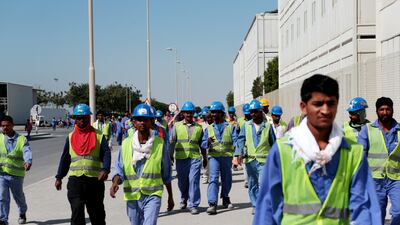ABU DHABI // Since 1982, the UAE has ratified nine international labour conventions on workforce law and employment viability.
The Forced Labour Convention of 1930 was ratified in 1982 and prohibits the use of forced labour. The convention aims to abolish indentured servitude regardless of the industry or form of work.
The Abolition of Forced Labour Convention of 1957 was ratified in 1997. It added conditions to the framework of the Forced Labour Convention.
It stated that countries which ratify the convention will not use forced labour as a means of political coercion, education or punishment for expressing political views opposing an authority. It also required signatories not to use forced labour as a means of mobilising workers for economic development or as a punishment for those who participate in strikes.
The Labour Inspection Convention of 1947 was ratified in 1982. It requires the UAE to maintain a system of labour inspection to be enforced by the Ministry of Labour. The convention sets general standards that workers must feel safe at their jobs, and safety conditions should be met.
Each member of the International Labour Organisation for which this convention is in force is expected to maintain a system of labour inspection at industrial workplaces. The law covers wages, safety, health, welfare and working hours.
The Hours and Work Convention requires a 48-hour maximum work week.
The Equal Remuneration Convention of 1951 established the principle of equal pay without discrimination between men and women. The UAE ratified the convention in 1997. Other GCC states declined to do so.
Through legislation and the introduction of wage determination, the UAE has worked on putting this into law.
In 2001, the UAE ratified the Discrimination Convention of 1958, which concerns discrimination in regard to employment and occupation. The purpose is to make countries enforce anti-discrimination laws.
The Child Labour Convention of 1999 and the Minimum Age Convention established ground rules against child labour. Countries that have ratified the convention must set a minimum age – not below 16 for full-time work – and punishments for those who break the law.
Finally, the Night Work Convention of 1948, ratified in 1982, states that women are forbidden to do industrial work between the hours of 10pm and 6am.
_____________________________________________________________
More coverage on this topic:
■ TDIC improves the lives of Saadiyat workers
■ Life on Saadiyat: catering staff try to please different palates
■ Passport retention by UAE companies less common
■ A tour of the Saadiyat Accommodation Village - in pictures
_____________________________________________________________
About this package:
The UAE has signed up to nine International Labour Organisation conventions to protect workers’ rights, and in 2006 was the first country in the region to enact a comprehensive anti-human trafficking law. These conventions spurred the Tourism Development & Investment Company (TDIC) to improve the quality of life for 7,000 employees living in workers villages on Saadiyat island. While most workers say they are satisfied with life in Saadiyat Accommodation Village, many have voiced concern about the poor taste of the food. Despite criticism, the purchasing power of the dirham in Southest Asian countries remains a major factor in attracting expatriates to the UAE. Similarly, concerns over passport retention have decreased as the practice has become less common in the UAE.
nalwasmi@thenational.ae

